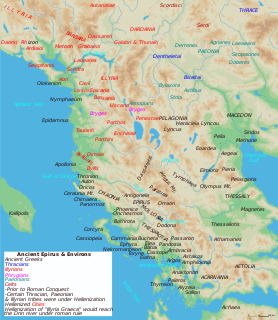
Alexander I of Epirus, also known as Alexander Molossus, was a king of Epirus (343/2–331 BC) of the Aeacid dynasty. As the son of Neoptolemus I and brother of Olympias, Alexander I was an uncle of Alexander the Great. He was also an uncle of Pyrrhus of Epirus.
During the 290s BC, Hellenistic civilization begins its emergence throughout the successor states of the former Argead Macedonian Empire of Alexander the Great, resulting in the diffusion of Greek culture throughout the Levant and advances in science, mathematics, philosophy, etc. Meanwhile, the Roman Republic is embroiled in war against the Samnites, the Mauryan Empire continues to thrive in Ancient India, and the Kingdom of Qin in Ancient China, the one which in the future will conquer its adversaries and unite China, begins to emerge as a significant power during the Warring States period.
Year 297 BC was a year of the pre-Julian Roman calendar. At the time it was known as the Year of the Consulship of Rullianus and Mus. The denomination 297 BC for this year has been used since the early medieval period, when the Anno Domini calendar era became the prevalent method in Europe for naming years.
In Greek mythology, Helenus was a son of King Priam and Queen Hecuba of Troy, and the twin brother of the prophetess Cassandra. He was also called Scamandrios. According to legend, Cassandra, having been given the power of prophecy by Apollo, taught it to her brother. Like Cassandra, he was always right, but unlike her, others believed him.

Neoptolemus, also called Pyrrhus, was the son of the warrior Achilles and the princess Deidamia, and brother of Oneiros in Greek mythology, and also the mythical progenitor of the ruling dynasty of the Molossians of ancient Epirus.
Pyrrhus, Pyrrhos or Pyrros (Πύρρος) may refer to:

Olympias was the eldest daughter of king Neoptolemus I of Epirus, the sister of Alexander I of Epirus, the fourth wife of Philip II, the king of Macedonia and the mother of Alexander the Great. She was extremely influential in Alexander's life and was recognized as de facto leader of Macedon during Alexander's conquests. After her son's death, she fought on behalf of Alexander's son Alexander IV, successfully defeating Adea Eurydice. After she was finally defeated by Cassander, his armies refused to execute her, and he finally had to summon family members of those Olympias had previously killed to end her life. According to the 1st century AD biographer, Plutarch, she was a devout member of the orgiastic snake-worshiping cult of Dionysus, and he suggests that she slept with snakes in her bed.

Pyrrhus was a Greek king and statesman of the Hellenistic period. He was king of the Greek tribe of Molossians, of the royal Aeacid house, and later he became king of Epirus. He was one of the strongest opponents of early Rome. Several of his victorious battles caused him unacceptably heavy losses, from which the term Pyrrhic victory was coined.
Cleopatra of Macedonia, or Cleopatra of Epirus, was an ancient Macedonian princess and later queen regent of Epirus. The daughter of Philip II of Macedon and Olympias of Epirus, she was the only full sibling of Alexander the Great. Her other siblings include half sisters Thessalonike and Cynane, and half-brother Philip III of Macedon.

The Molossians were a group of ancient Greek tribes which inhabited the region of Epirus in classical antiquity. Together with the Chaonians and the Thesprotians, they formed the main tribal groupings of the northwestern Greek group. On their northern frontier, they neighbored the Chaonians and on their southern frontier neighbored the kingdom of the Thesprotians. They formed their own state around 370 BC and were part of the League of Epirus. The most famous Molossian ruler was Pyrrhus of Epirus, considered one of the greatest generals of antiquity. The Molossians sided against Rome in the Third Macedonian War and were defeated. Following the war, 150,000 Molossians and other Epirotes were enslaved and transported to the Roman Republic, overwhelmingly in Italy itself.

Neoptolemus was a Macedonian officer who served under Alexander the Great.
Arybbas was a king of the Molossians.
Alcetas I was a king of Epirus, the son of Tharrhypas.
Neoptolemus II was king of Epirus from 302 BC until his death. He was the son of king Alexander I of Epirus and Cleopatra of Macedonia, his maternal grandparents were Philip II of Macedon and Olympias. His maternal uncles included Alexander the Great and Philip III of Macedon. His maternal aunts included Thessalonike and Cynane.

Aeacidae refers to the Greek descendants of Aeacus, including Peleus, son of Aeacus, and Achilles, grandson of Aeacus—several times in the Iliad Homer refers to Achilles as Αἰακίδης. Neoptolemus was the son of Achilles and the princess Deidamea. The kings of Epirus and Olympias, mother to Alexander the Great, claimed to be members of this lineage.
Neoptolemus I of Epirus was a Greek king of Epirus and son of Alcetas I, and father of Troas, Alexander I of Epirus and Queen Olympias. He was a maternal grandfather of Alexander the Great. He claimed he was a descendant of hero Achilles and King Lycomedes, while Emperor Caracalla claimed that he was a descendant of Neoptolemus I. Olympias was originally known as Polyxena and it is possible that Neoptolemus gave her that name.
Antigone was a Greek Macedonian noblewoman. Through her mother's second marriage she was a member of the Ptolemaic dynasty and through her marriage to Pyrrhus she was queen of Epirus.






